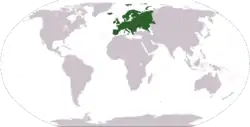Europe
English

World map showing the location of Europe (continent).
Etymology
From Latin Europa, from Ancient Greek Εὐρώπη (Eurṓpē), of uncertain origin, but either from:
- Ancient Greek εὐρύς (eurús) + ὄψ (óps), literally meaning "wide face" (as a description of the beauty of the mythical Europa) or "broad eye" (metaphorically meaning something like "as far as the eye can see")
- Semitic origin, such as:
- Akkadian 𒌓𒋙 (erebu, “to set, occident, west”),
- Phoenician 𐤏𐤓𐤁 (ʿereb, “evening”).
- Aramaic ערובה (ʿrōbā, “sunset, Sabbath eve”),
- Hebrew בֶּן‑עֲרֻבָּה (ben‑aruboh, “hostages”) and מַעֲרָב (ma‑ārov, "occident, west"),
- Classical Syriac ܥܪܘܒܐ (aruba, “hostages”) and ܡܥܪܒܐ (ma‑arba, "occident, west"),
- Arabic غَرْب (gharb, “occident, west”),
Pronunciation
- (General New Zealand) IPA(key): /ˈjʊ(ə)ɹəp/, /ˈjʉəɹɘp/
- (UK) IPA(key): /ˈjʊəɹəp/, /ˈjɔːɹəp/
- (US) IPA(key): /ˈjʊɹəp/, /ˈjɝəp/
Audio (US) (file) Audio (AU) (file)
Proper noun
Europe
- The portion of Eurasia west of the Urals, traditionally considered a continent in its own right, located north of Africa, west of Asia and east of the Atlantic Ocean.
- How can Europe exist without the European Union?
- A political entity; the European Union.
- (Britain, Ireland) Continental Europe, typically the western portion, and excluding the island nations or the larger Mediterranean islands.
- (soccer) International club competitions operated by UEFA, the sport's governing body for Europe.
Hypernyms
Hyponyms
- (countries of Europe) country of Europe; Albania, Andorra, Armenia, Austria, Azerbaijan, Belarus, Belgium, Bosnia and Herzegovina, Bulgaria, Croatia, Cyprus, Czech Republic, Denmark, Estonia, Finland, France, Georgia, Germany, Greece, Hungary, Iceland, Ireland, Italy, Kazakhstan, Latvia, Liechtenstein, Lithuania, Luxembourg, North Macedonia, Malta, Moldova, Monaco, Montenegro, Netherlands, Norway, Poland, Portugal, Romania, Russia, San Marino, Serbia, Slovakia, Slovenia, Spain, Sweden, Switzerland, Turkey, Ukraine, United Kingdom, Vatican City
Descendants
Translations
European Union — see European Union
continent
|
|
See also
- (continents) continent; Africa, America, Antarctica, Asia, Europe, North America, Oceania, South America (Category: en:Continents)
French
Etymology
From Latin Eurōpa, from Ancient Greek Εὐρώπα (Eurṓpa), a character in Greek mythology.
Pronunciation
- IPA(key): /ø.ʁɔp/
(file)
Derived terms
Latin
Pronunciation
- (Classical) IPA(key): /eu̯ˈroː.peː/
Inflection
First declension, Greek type, with locative.
| Case | Singular |
|---|---|
| Nominative | Eurōpē |
| Genitive | Eurōpēs |
| Dative | Eurōpae |
| Accusative | Eurōpēn |
| Ablative | Eurōpē |
| Vocative | Eurōpē |
| Locative | Eurōpae |
References
- Europe in Charlton T. Lewis and Charles Short (1879) A Latin Dictionary, Oxford: Clarendon Press
This article is issued from Wiktionary. The text is licensed under Creative Commons - Attribution - Sharealike. Additional terms may apply for the media files.